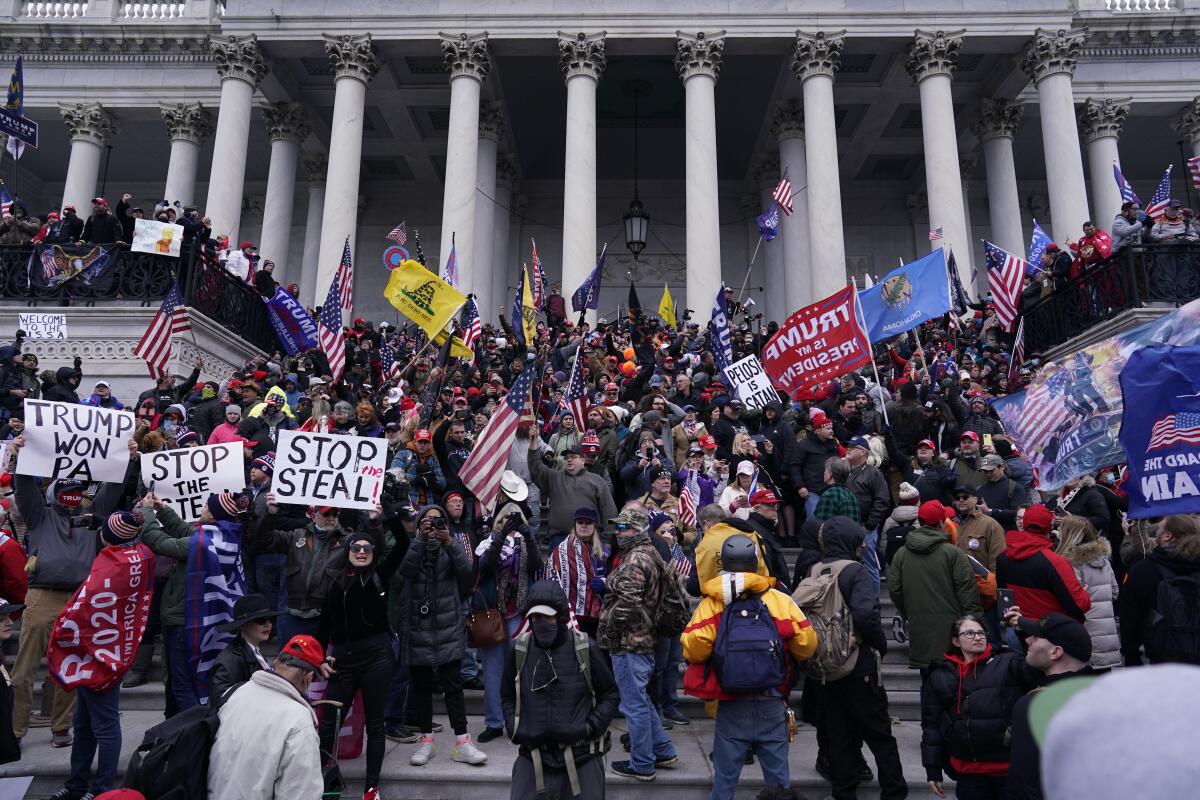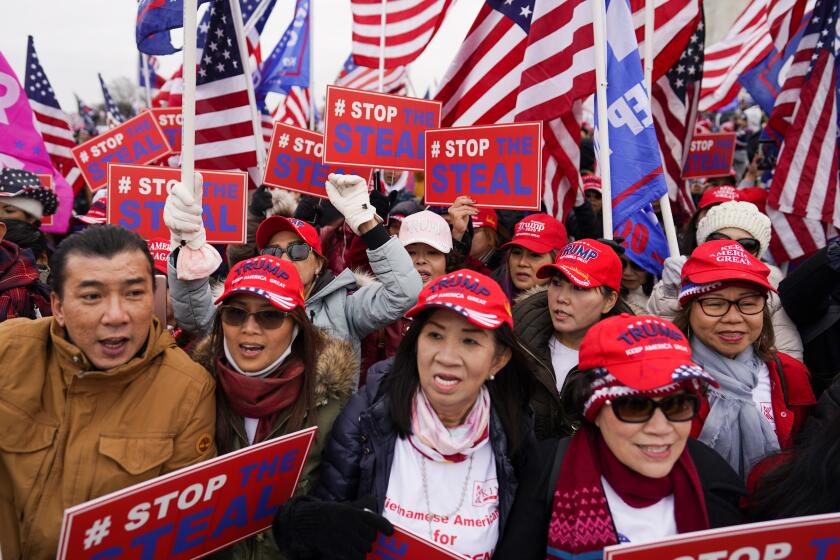Jan. 6 committee to connect Oath Keepers, Proud Boys and QAnon to Trump allies

- Share via
WASHINGTON — The committee investigating the Capitol insurrection will focus for the first time this week on the relationship between people in former President Trump’s orbit and the extremist groups that planned and orchestrated the violence on Jan. 6, 2021.
The hearing could be one of the most consequential held by the panel, potentially answering the long unresolved question of whether Trump knew that far right extremist groups such as the Proud Boys and Oath Keepers would storm the Capitol, and whether the president was in contact through intermediaries with the groups’ leaders, who have since been indicted for seditious conspiracy.
Rep. Jamie Raskin (D-Md.), who will lead the hearing with Rep. Stephanie Murphy (D-Fla.), has made clear the committee won’t present smoking-gun evidence. But he said the panel will show how the extremist groups took Trump’s announcement of a “wild” rally hours before Congress met to certify the election results as acue to mobilize and prepare to keep him in power through any means necessary.
Never-before-seen video of the hours-long riot that temporarily paused certification of Joe Biden’s victory has been prominently featured during the committee’s first six hearings. Committee Chairman Bennie G. Thompson (D-Miss.) blamed Trump for the “carnage” that “represented Trump’s last, most desperate chance to halt the transfer of power.”
But the committee hasn’t yet drawn a direct line between Trump’s camp and those who caused the violence. So far the hearings have largely focused on the pressure Trump and his team put on state lawmakers and Vice President Mike Pence to overturn the election results, and on the Justice Department to publicly ratify their claims of fraud.
The names or number of witnesses for Tuesday’s hearing will not be announced in advance, committee aides told reporters in a briefing Monday, citing concerns about potential threats and harassment.
“The committee intends to show the American people that this was not just some random occurrence, that these groups happened to show up at the same place as the broader Stop the Steal mob,” said Jon Lewis, a research fellow on domestic violent extremism at the George Washington University Program on Extremism. “A lot of what will be distilled out by the committee will really just be showing the American people that these groups mobilized intentionally to the U.S. Capitol, at the behest of the president, at the behest of his inner circle of advisors and hangers-on, and they were there with the intent not just to protest, not just to attend a rally, not just to provide security ... [but] with the explicit purpose of engaging in a conspiracy to prevent the peaceful transfer of presidential power.”
Committee aides said the hearing will look at ties among the Proud Boys, Oath Keepers and QAnon, along with former national security advisor Michael Flynn and Republican operative Roger Stone. It also will examine what White House staff and advisors knew about the potential for violence and which members of Congress pressured Pence in the days before Jan. 6 to change the election outcome.
The committee has already started building the case over the last month.
At the last hearing, Cassidy Hutchinson, an aide to former Trump Chief of Staff Mark Meadows, testified that Trump knew people in the crowd at his speech were armed when he urged them to march on to the Capitol.
Hutchinson also testified that Trump directed Meadows to contact Flynn and Stone the night before Jan. 6, 2021. Hutchinson said she had to talk Meadows out of going to the Willard Hotel, where Flynn and Stone were staying along with others who had worked to overturn the election results. She told the committee Meadows instead spoke with them by phone and she did not know what was discussed.
At the time, Stone had a longstanding relationship with the Proud Boys and Flynn was being escorted by a security detail made up of members of the Oath Keepers.
Though Stone and Flynn largely invoked their 5th Amendment right against self-incrimination in their deposition, former Proud Boys chairman Enrique Tarrio and others are among the more than 1,000 people who have complied with the committee’s requests and sat for lengthy depositions, clips of which are likely to appear in Tuesday’s hearing.
Like Stone and Flynn, Oath Keepers founder Stewart Rhodes did not answer many of the committee’s questions during his deposition. Last week, his attorney said Rhodes would testify before the committee, but only if it would be televised live, a demand the committee is unlikely to oblige.
On Tuesday, the committee is expected to focus on how Trump’s Dec. 19 tweet urging supporters to “be there” for a “big protest” in Washington that would “be wild” was the impetus for the Proud Boys and Oath Keepers to begin planning and organizing. That tweet was sent an hour after Trump met with Flynn and others to discuss whether to issue an executive order to have federal agents seize election machines from certain states.
“We will lay out the body of evidence that we have that talks about how the president’s tweet on the wee hours of Dec. 19 of, ‘Be there, be wild,’ was a siren call to these folks,” Murphy said on NBC’s “Meet the Press” on Sunday. “And we’ll talk in detail about what that caused them to do, how that caused them to organize, as well as who else was amplifying that message.”
How a team of cyber experts and lawyers came together in the days after the 2020 election to try to find information suggesting fraud, in an attempt to keep Trump in office despite his defeat.
The panel is likely to lay out that the leaders of the extremist groups saw the violence as an integral part of keeping Biden from becoming president, and that they believed giving Trump an excuse to invoke the Insurrection Act and declare martial law could help overturn the election. Others thought that by preventing certification from occurring Jan. 6 as required under the Electoral Count Act, Pence would have cover to delay the process while key state legislatures weighed overturning the results and approving electors for Trump.
Although committee members have talked about connecting the violence back to people in Trump’s orbit, Brennan Center for Justice fellow Michael German said the committee also needs to examine the intelligence failures that allowed white supremacists and extremist groups to gather en masse and storm the Capitol.
“Too much of a focus on the particular actors in the administration may suggest it’s an aberration, that as long as those people don’t get back into government, we’re OK, when what we see is a number of systemic failures. And those failures all need to be addressed because we have to shore up the institutions that are supposed to keep protecting us,” German said.
The hearing also has the potential to affect the prosecution of the highest profile criminal cases related to the events of Jan. 6, 2021, which have been brought against the leaders of the Proud Boys and Oath Keepers.
The committee has stressed its work is separate from the Justice Department’s investigations, going so far as to initially refuse to share depositions. Federal prosecutors are watching what new evidence the committee might have and the dots it has connected that might inform future trials.
The federal government has hundreds of pending cases, with hundreds more rioters being sought for prosecution, and the hearing comes before the majority of cases have gone to court. Several of those charged with sedition have claimed the hearing will taint their chances of a fair trial, and last month a federal judge moved the trial for five Proud Boys leaders facing seditious conspiracy charges until at least December, citing the ongoing publicity surrounding the hearings.
The committee is expected to give the Justice Department at least some of the more than 1,000 depositions and tens of thousands of pages of documents it collected during its investigation. Lewis said prosecutors will look closely at what rioters told the FBI and the committee.
“You’ve kind of seen a bit of the butting of heads between legislative and executive in terms of DOJ wanting those transcribed interviews now [and] the committee, holding off on that for a bit. But I think ultimately, when you do see that transferral [of documents], if anything, I think it would just serve to provide further evidence to DOJ for their ongoing prosecutions,” he said.
Get the L.A. Times Politics newsletter
Deeply reported insights into legislation, politics and policy from Sacramento, Washington and beyond. In your inbox twice per week.
You may occasionally receive promotional content from the Los Angeles Times.









